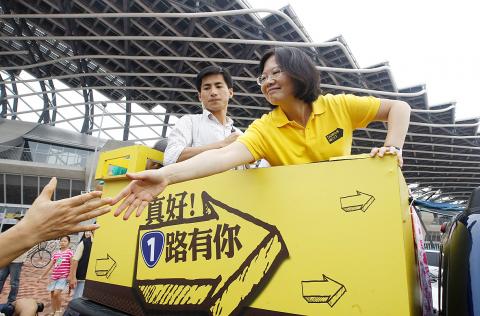Comments by Democratic Progressive Party (DPP) Chairperson Tsai Ing-wen (蔡英文) on Saturday that were seen as affirming her recognition of the Republic of China (ROC) drew mixed responses from the government and members of the green camp.
Addressing a campaign event in Greater Kaohsiung, Tsai, a candidate in January’s presidential election, said the ROC was Taiwan and Taiwan was the ROC, adding that the ROC government today was no longer a foreign government.
Tsai said that in the past 62 years, the ROC only existed in Taiwan and had blended with the land and its people.

Photo: CNA
“The majority of the people in Taiwan agree that Taiwan is the ROC and the ROC is Taiwan,” she said.
Explaining Tsai’s remarks yesterday, DPP spokesman Chen Chi-mai (陳其邁) said they did not signify a departure from the party’s previous stance on sovereignty, nor were they timed to coincide with the ROC’s centennial celebrations.
Anyone who has studied the party’s platform in the past decade will know that this view is consistent and logical, he said.
Tsai’s remarks prompted some soul-searching in the green camp.
“The DPP can say what it wants and we’ll say what we want, as long as we get enough votes to win the election,” Taiwanese Society of International Law (TSIL) secretary-general Lee Ming-chun (李明峻) said -yesterday. “We are absolutely against the ROC, but it doesn’t matter that Tsai says that Taiwan is the ROC. We believe in her and we can change that after we win the election.”
Tsai’s comments were also discussed at the ROC and Taiwan’s Historical Lessons from the 1971 UN meeting hosted by the Taiwan National Alliance.
Chen Yi-shen (陳儀深), an associate researcher at the Institute of Modern History at Academia Sinica, said Tsai was a candidate in the presidential election and that elections “have their own language.”
Many are aware that the ROC and Taiwan are two faces of the same coin, Chen said, adding that the ROC Tsai was talking about was different from the ROC President Ma Ying-jeou (馬英九) referred to.
Ma’s ROC is one that overlaps with China, Chen said, adding that Tsai’s ROC was an extension of the ROC from former presidents Lee Teng-hui (李登輝) and Chen Shui-bian (陳水扁).
TSIL convener Yao Chia-wen (姚嘉文) said the presennt ROC referred to Taiwan proper plus the islands of Kinmen, Penghu and Matsu rather than China in its entirety.
“An inappropriate name is a hassle and we need to promote the rectification our nation’s name to the Republic of Taiwan,” Yao said.
The Presidential Office welcomed Tsai’s remarks, saying they affirmed her recognition of the ROC, and called on her to attend today’s ROC centennial ceremonies.
“Although Chairperson Tsai had a completely different interpretation on the issue, we acknowledge her willingness to recognize the ROC,” Presidential Office spokesman Fan Chiang Tai-chi (范姜泰基) said.
Fan Chiang said Tsai’s latest rhetoric was a deviation from her previous description of the ROC government as “a government-in-exile,” adding that Tsai should stop changing her position on the issue of national identity.
“[Recognizing the legitimacy of the ROC government] is what a presidential candidate of the ROC should do and her latest comments reflect the opinion of the majority of people in Taiwan. We expect her not to change her position again,” he said.

The Ministry of the Interior (MOI) is to tighten rules for candidates running for public office, requiring them to declare that they do not hold a Chinese household registration or passport, and that they possess no other foreign citizenship. The requirement was set out in a draft amendment to the Enforcement Rules of the Public Officials Election and Recall Act (公職人員選舉罷免法 ) released by the ministry on Thursday. Under the proposal, candidates would need to make the declaration when submitting their registration forms, which would be published in the official election bulletin. The move follows the removal of several elected officials who were

The Republic of China (ROC) is celebrating its 114th Double Ten National Day today, featuring military parades and a variety of performances and speeches in front of the Presidential Office in Taipei. The Taiwan Taiko Association opened the celebrations with a 100-drummer performance, including young percussionists. As per tradition, an air force Mirage 2000 fighter jet flew over the Presidential Office as a part of the performance. The Honor Guards of the ROC and its marching band also heralded in a military parade. Students from Taichung's Shin Min High School then followed with a colorful performance using floral imagery to represent Taiwan's alternate name

COVETED PRIZE: The US president would be a peace prize laureate should he persuade Xi Jinping to abandon military aggression against Taiwan, William Lai said US President Donald Trump should get the Nobel Peace Prize should he be able to convince Chinese President Xi Jinping (習近平) to abandon the use of force against Taiwan, President William Lai (賴清德) told a conservative US radio show and podcast in an interview. The US is Taiwan’s most important international backer, despite the absence of formal ties, but since Trump took office earlier this year he has not announced any new arms sales to the nation. Trump could meet Xi at the APEC summit in South Korea on Oct. 31 and Nov. 1. Lai, speaking on The Clay Travis and Buck Sexton

A Chinese takeover of Taiwan would severely threaten the national security of the US, Japan, the Philippines and other nations, while global economic losses could reach US$10 trillion, National Security Council Deputy Secretary-General Lin Fei-fan (林飛帆) wrote in an article published yesterday in Foreign Affairs. “The future of Taiwan is not merely a regional concern; it is a test of whether the international order can withstand the pressure of authoritarian expansionism,” Lin wrote in the article titled “Taiwan’s Plan for Peace Through Strength — How Investments in Resilience Can Deter Beijing.” Chinese President Xi Jinping’s (習近平) intent to take Taiwan by force